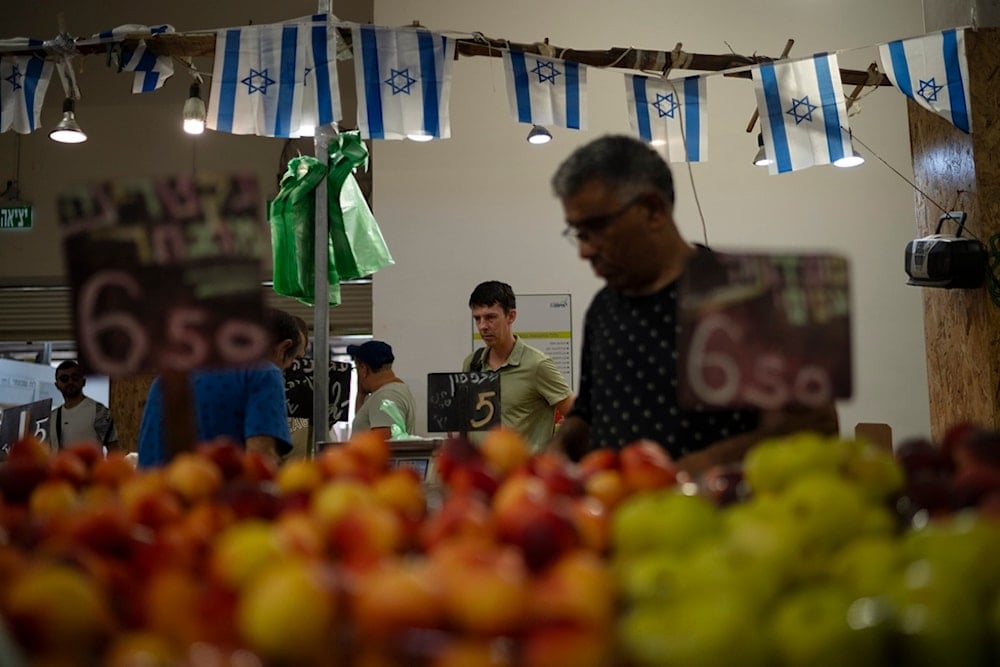Quarter of Israelis grapple with poverty as war continues: Report
An Israeli report examines the socioeconomic repercussions of the war on Gaza, revealing that millions of Israeli settlers have been suffering of increased rates of poverty and economic challenges.
-

People buy fruits and vegetables in a local market in Haifa, occupied Palestine, on Friday, August 16, 2024. (AP)
Millions of Israelis are grappling with poverty, the Israeli humanitarian organization Latet revealed, based on its 2024 annual alternative poverty report, detailing the number of Israeli families and individuals living in poverty.
According to the report, around a million Israeli settlers are facing difficulties paying their primary dues and bills and are suffering in light of the continuously deteriorating economic state as the war rages on for its 14th month.
Consequently, 678,200 families (22.3%) and 2,756,000 individuals (28.7%) are struggling with poverty, including 1,240,000 children (39.6%).
Latet found that the economic situation has deteriorated for 65% of Israeli beneficiaries, and for 32.1% of the general public over the past year. Additionally, children in benefiting families have been significantly affected by the war: 44.6% in terms of academic achievements and 46.7% in their psychological condition.
As for the elderly, 52.6% of those supported by the government suffer from severe poverty, while more than a third of them (34.8%) experience severe food insecurity.
Furthermore, 84.8% of support beneficiaries suffer from energy shortages, 68.6% report that their mental health is poor, and 70.8% have forgone purchasing necessary medications and medical treatment. Additionally, the monthly expenditure of supported families is 1.7 times higher than their average income.
Meanwhile, 94.2% of food aid organizations did not receive government support to meet the needs arising from the war, and 70.9% reported a decrease in donations.
In this context, the Israeli Srugim website confirmed that the minimal cost of living in "Israel" is estimated at 5,355 shekels per individual and 13,617 shekels per family, while most supported families are far from reaching this threshold.
The economic forecasts for 2025, however, indicate that the situation will worsen due to sharp increases in the prices of essential goods.
'Israel's' war manifests poverty
Economist Jacques Bendelac previously said that over the past twenty years, "Israel" has relied heavily on credit consumption. However, settler families have been unable to pay off their debts and loans, particularly amid the current circumstances.
He warned that high living costs, combined with an economic slowdown, would "inevitably lead to an increase in poverty." Humanitarian organizations are already witnessing a rising demand for their services, with new individuals appearing in food distribution lines.
For example, in a shopping center parking lot in Rishon Lezion, the NGO Pitchon-Lev, or "Open Heart," provides free baskets of fruits, vegetables, and meat twice a week. Founder Eli Cohen stated that since the war began, the organization more than doubled its activities, and was now supporting nearly 200,000 families across occupied territories.
New beneficiaries include "young individuals, families with husbands serving as reservists, many former donors, and all those who were evacuated from northern settlements due to the ignition of the northern front.
Regarding recovery prospects, Bendelac noted that "there is typically a strong economic rebound" following the end of a war. However, he cautioned that "the longer this war continues, the slower and more challenging the recovery will be."
Read more: Why 'Israel's' ultimate defeat will come from economic isolation

 3 Min Read
3 Min Read








